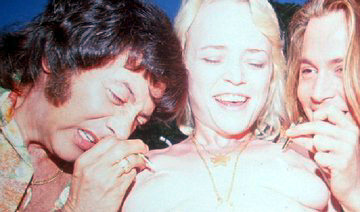|
George's dad (Ray Liotta, playing a nice guy beautifully, as I knew he could), was a man with values. He was devoid of personal greed, he always forgave his shrewish wife and doted on his son (Johnny Depp, excellent as always). Ol' dad never cheated anyone, was loyal to his friends and family, and was constantly being taken advantage of by baser, greedier people. He had a na´vetÚ which led to a lifetime of financial difficulties, because in the cutthroat business world, his integrity was considered a fatal weakness by his unscrupulous friends. He build up a solid little business with several trucks and several employees, but he lost it all. When he hit bottom, he told his son that it wasn't that important, that money wasn't what counted. His wife saw his failure another way, and berated him constantly in front of the boy. George, the future cocaine kingpin, grew up in a different world, but ended up with a life almost identical to his dad's, just on a different scale. Once, in his naive youth, after a dinner with his parents, George and his first love had resolved never to end up like like the older couple they had just dined with. Sadly and ironically, George lost the girl (Lola Rennt's Franka Potente, speaking almost perfectly unaccented English) to cancer, then ended up reliving his father's life on a grander scale. George, too, was honest in his dealings, was never greedy, never broke a promise, shared his good times with the people he cared for, and rewarded anyone who did something nice for him. Like his dad, he was considered a naive babe in the woods by a string of unprincipled hard guys who gradually took more and more of his pie. Just like his dad, he built a nice little empire, then lost almost everything. When he hit rock bottom, there was a scene precisely parallel to an earlier one with his parents, in which George's wife berated him in front of their child for his lack of earning power. When George went down, he insisted that the feds get his ungrateful wife and daughter to safety, just as his own father had always forgiven his ungrateful mother. An evocative element of the movie, at least for us aging boomers, was the uncomfortable transition of the drug market's money-maker from marijuana to cocaine in the 70s, which necessitated that George deal with gun-toting Colombians instead of peaceful hippies and small farmers. George looked back on the hippie marijuana days as the idyllic part of his life, filled with songfests on the beach, laid-back friends, and good vibes. I guess you probably know that most of us who lived through the 60's and 70's see it the same way. Marijuana represented our youth, sweet times, mellow vibes. It was associated with peace and love and music. Cocaine represented everything that went wrong after the movement died: greed, violence, edginess, material possessions, egocentrism. Watching George's transition in the film brought back a lot of forgotten memories for me. |
|||||
| Paul Rubens! Is it a really good episode of Pee-Wee's Playhouse? |
|
||||
|
George was ultimately betrayed by everyone he ever trusted, but you should not be deceived into thinking this was some sort of behavior endemic to the cocaine business. Business is business. It's just that in that particular business, the stakes are higher than in just about any other business, and that factor magnifies the greed. Furthermore, that particular business is illegal, so it attracts people who are comfortable outside the law, and that factor magnifies the danger. George's product thus made his business more dangerous and more cutthroat than his dad's, but aside from the nature of his product, George was just another failed small-time entrepreneur like his dad. And like his dad, he knew that wasn't really important. He knew that his real failure was with his own daughter. George's dad had been a success in one sense: he managed to transmit a certain set of values to his son, and the two of them developed a genuine bond and respect. George was not able to establish this level of contact with his own child. George's daughter never did make peace with him, and has to this date never visited him in prison. He still has another 14 years of incarceration before he is set free. |
||||
|
|||||

